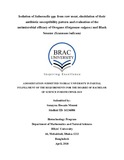Isolation of Salmonella spp. from raw meat, elucidation of their antibiotic susceptibility pattern and evaluation of the antimicrobial efficacy of Oregano (Origanum vulgare) and Black Sesame (Sesamum indicum)

View/
Date
2018-04Publisher
BRAC UniveristyAuthor
Moumi, Sunayna HossainMetadata
Show full item recordAbstract
With the increasing consumption of beef all over the world, the prospect of Salmonella spp. as a potential reservoir of antibiotic resistance was investigated. As plants are considered new sources of antimicrobial agents against antibiotic resistant bacteria, the antibacterial activity of Oregano (Origanum vulgare) and Black Sesame (Sesamum indicum) were evaluated against the Salmonella spp. isolates. A total of 14 Salmonella spp. isolates were obtained from 20 raw beef samples collected from different areas of Dhaka city. Antibiotic susceptibility test of these isolates was done using 24 antibiotics belonging to eight groups – Aminoglycoside, Beta–Lactam, Lincosamide, Macrolide, Nitroimidazole, Quinolone, Sulfonamide and Tetracycline. The antibiotic susceptibility test reported that all the isolates were resistant to Oxacillin, Erythromycin, Tetracycline, Clindamycin, Co-Trimoxazole, Metronidazole, Sulfamethoxazole, Norflaxacin, and Azithromycin. The results also revealed that the isolates exhibited resistance to Cephalexin and Ceftriaxone (86%), Levofloxacin and Penicillin (79%), Kanamycin (71%), Ceftazidime (64%), Amikacin (43%) and Ciprofloxacin (7%) respectively. In addition, the results revealed that the isolates were intermediately resistant to Streptomycin (71%), Amoxicillin and Ampicillin (64%), Imipenen (43%), Ceftazidime (36%), Penicillin (21%), Cephalexin and Ceftriazone (14%), and Kanamycin (7%). No isolate was resistant to two antibiotics which were Chloramphenicol and Cefixime. As an alternative, the Methanolic, Ethanolic and Aqueous extracts of Oregano and Sesame respectively were subjected against the isolates to evaluate the antimicrobial activity. Remarkable antimicrobial activity was observed by the Methanolic extract of Oregano with average zone of inhibition of 23.6 mm, followed by the Ethanolic extract of Oregano with average zone of inhibition of 17.6 mm and least by the Aqueous extract of Sesame with average zone of inhibition of 10.6 mm. The Aqueous extract of Oregano and the Methanolic and Ethanolic extracts of Sesame did not show any antibacterial activity. This study showed that the Salmonella spp. isolates are becoming resistant to 17 antibiotics that are commonly used for Salmonella spp. illness – Amoxicillin, Levofloxacin, Cephalexin, Ampicillin, Ciprofloxacin, Ceftazidime, Ceftriazone, Nalidixic Acid, Sulfamethoxazole, Imipenen, Amikacin, Clindamycin, Norflaxacin, Azithromycin, Co-Trimoxazole, and Metronidazole. However, commonly used Cefizime and Chloramphenicol were reported to be effective antibiotics in this study. Lastly, the presence specific components responsible for the efficacy displayed by Oregano could yield in the formulation and research of an effective drug to treat highly antibiotic resistant bacteria.
